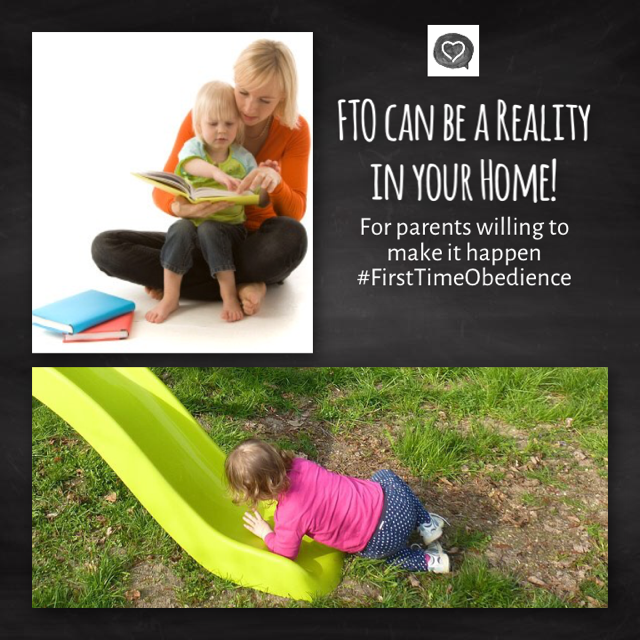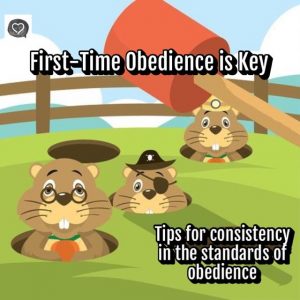First Time Obedience
posted in: Heart Training, Moral Training, Speak Life
0
“Yes, Mom. I’ll obey. Right away. All the way. The happy way.” What would you do if your six-year-old answered your instruction with this little mantra? What if I told you I know children who have done this? Would you even believe me? Those five little statements are the simplest definition of what First Time Obedience (FTO) is. They are not some dream that a parent can only wish for while passed out from exhaustion. FTO can be a reality in your home.
Have you ever heard someone say, “A child will rise to the parent’s expectation.”? I do not know who is credited with that little nugget of wisdom, but they were right. In fact, that is true of all of us–child or adult. We will do what is expected. Rarely, will we do more than what is expected. Most often, we will do less, IF (and that is a great, big, gigantic, in-your-face, neon-lit, flashing-bright-light “IF”) we know we can get away with less. Are you having an a-ha moment? You should be.
FTO is really quite simple. You expect your child to obey the first time and in return, your child obeys the first time. Ta-da! Problem solved. Thank you. Thank you very much. You can now proceed with your parenting and never have another conflict. Life will heretofore be filled with nothing but sunshine and rainbows. Wait! What? Oh, sorry, I lapsed into my own little dream where we all live in a perfect world. I will save that for another blog.
While FTO is simple in theory, it takes a little, well, it takes a lot of parental work. When I say it takes a lot of work, I don’t mean it takes a lot of knowledge or creativity or genius or study. I mean it takes a lot of work. As in, you have to be the parent! You have to get your hands dirty. You have to work hard. Say what you mean and mean what you say. Oh, there is another one of those little anonymous gems that are actually true. If you say it is time for bed, well, then it is time for bed. If you say it is time to leave the playground, well, then it is time to leave the playground. Often times we find ourselves stressed-out and exhausted by the attitudes and actions of our children, but how often is that exhaustion the result of them wearing you down? You know what I mean. The child knows what I mean. Listen to me, that child KNOWS what I mean. “Just one more book, Mommy. Just one more time down the slide, Mommy.” Sometimes the child says it with such a sweet, angelic little face that your heart just melts and you say, “Sure, we can read one more.” But, do you know what that child just heard? He heard you say, “I know I said it was time for bed, but because you asked/begged for one more book, I will change my mind and do what you want to do instead of what I said you should do.” Seriously, that is what your child heard. Now, I am not saying there is never a time for the extra book. Those times of extra books and extra slides down the slide should happen. I am just saying that those times should be the exception not the rule. When the rule is just-one-more because the child asked, you will never have FTO, because that is the exact opposite of FTO. And the never-ending cycle of stress, conflict, and exhaustion just keeps its wheels turning on down the parenting road.
So, what is a stressed-out, exhausted, worn-out parent to do? Those five little statements, with which I began this blog, those are your solution. Let’s quickly look at them one at a time.
- Yes, Mom. Do your children respond to you when you give them an instruction? They should. A response such as “yes, mom” lets you know the child heard you, and the child hears himself agree to your instruction. This one simple answer has the power to reduce at least half of your battles in any given day.
- I’ll obey. What would you do if your child said this to you? You would probably feel like the world’s most accomplished parent. And, you know what, you would be right. It is a huge accomplishment to teach a child to choose to obey. When your child can obey a parent, he can obey other authority figures, which is really just the stark reality of the rest of our lives.
- Right away. Okay, now it is getting radical, right? Right away? You mean a child can obey right away? Let me answer your question with a question. Can your child obey the second time you instruct him? The third? What’s your number? On what number of instruction does the child finally obey because he knows you mean it this time? The number does not matter. What matters is what you are doing differently that time that sends the message to your child that you really mean it. Whatever that is, move it up to the first time you give the instruction and you will have “right away”, making you feel like you just might survive this parenting thing after all.
- All the way. I know, I know. There is no way, right? Your child will never do what you told them to do all the way. As in… done. Final. Finished. Finis. Wrapped up. Curtain, because the fat lady sang. Are you ready for this? He will! Again, we rise to the expectation. If you as the parent expect him to do it “all the way”, then he will do it “all the way”.
- The happy way. This is the real challenge. Any kid can obey, right away, and all the way. Any adult can obey, right away, and all the way. How many kids do you know, how many adults do you know, that can obey with a happy heart? Ouch! Did I just step on your toes? This one is personal to every person on earth. We may not always want to obey. We may not always want to obey right away. We may not always want to obey completely, but we can. If we are honest with ourselves, if we are honest about our children and our parenting, we know we can obey. We know our kids can obey. But, obeying with a happy heart? Hmm, how are you doing with that in your own life Mom and Dad? What are you modeling about obedience to your own children? Cleaning toilets is not a glamorous job. Do you do it without complaining? I am not saying you have to be joyful about cleaning the toilet. I am saying you can do it without complaining. I am saying you can do it because it needs to be done. The same is true for our children. They may not want to go to bed or leave the playground, but they can do it without throwing a fit. You can choose a happy heart and so can your child.
What did obedience look like in your house today? Was there a dirty-faced, toothless grin smiling at you with a “yes, mom” as you told him it was time to leave the playground? Do you wish there had been? FTO is not just the stuff parenting dreams are made of. FTO is a reality when parents are willing to do the work. Are you ready?



